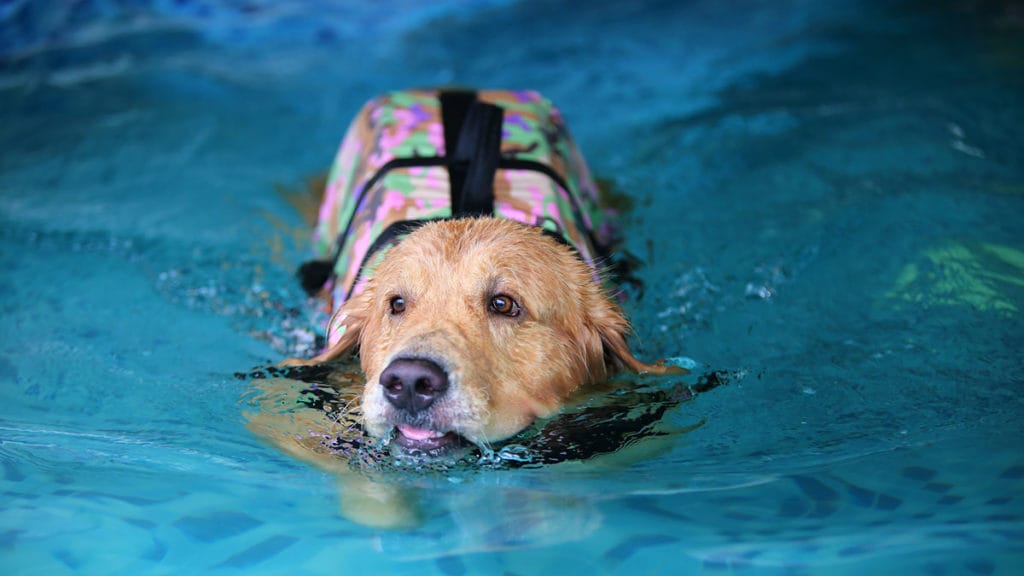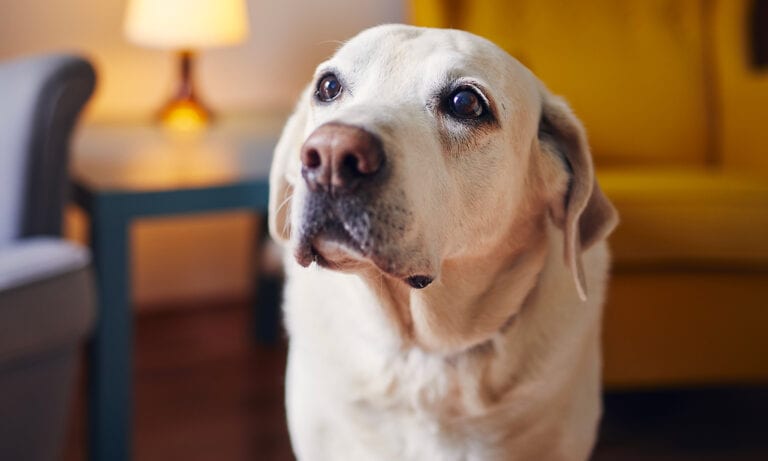Senior dog care can be a bit more complicated than caring for a younger pup. As dogs get older, they often develop health ailments that come with aging. Treating these ailments can be more difficult, as well, because certain procedures pose more risk for older pets. Thankfully, there are many holistic therapy options available for dogs to address pain and mobility issues.
Robert Goldstein, VMD, a holistic veterinarian at Healing Center for Animals in Westport, Connecticut, and Sarah Wooten, DVM, at Sheep Draw Veterinary Hospital in Greeley, Colorado, ran through a list of alternative therapies that can help senior dogs. From acupuncture and chiropractic work to good old-fashioned fish oil supplements, these alternatives are designed to complement regular veterinary care.
1. Acupuncture
Acupuncture for dogs? Yes, it’s a thing, and it can help a range of senior dog issues. As with human acupuncture, it involves strategically placed needles, a therapeutic laser or pressure that helps direct the flow of energy through the body, Dr. Wooten says.
“Acupuncture is an ancient Eastern medicine modality that is purported to move ‘qi,’ which is energy, along meridian lines in the body,” she says. “It is usually used for pain associated with joints or bones, or in conjunction with physical therapy in rehabbing a dog after surgery.”
Dr. Goldstein says this holistic therapy especially is effective in senior dogs.
“It can help older and aging animals suffering from inflammatory conditions, such as spinal problems, hip and elbow dysplasia, and other forms of arthritis,” he says. “It can also help relieve gastrointestinal conditions, such as colitis and inflammatory bowel disease, and help with the prevention of chronic stomach problems, neurological problems and postsurgical pain.”
Acupuncture sessions can vary. For acute or short-term pain, only 1-2 acupuncture sessions are recommended, Dr. Wooten says. For chronic pain management, sessions might be ongoing. Session duration and frequency really depend on the senior dog’s response to the therapy.
2. Hydrotherapy
Hydrotherapy involves using—you guessed it!—water to help soothe and heal sore muscles and joints. It’s similar to how humans use hot tubs or warm baths to relieve soreness, but it goes a step further, Dr. Wooten explains.
“Warm water helps the muscles relax and ease joint pain to allow for a pet to be more comfortable when he exercises,” she says. “The water supports the pet’s weight, which helps with pain relief and increasing the range of motion in stiff joints.”
A dog is either immersed in warm water or warm water is applied directly to the stiff joint via a water massage tool, according to Dr. Wooten. Sometimes a dog will use a treadmill and be submerged just enough so that they’re buoyant, but their paws are able to use the treadmill. Walking on an underwater treadmill immersed in warm water can be incredibly therapeutic for arthritic dogs, extremely frail or weak dogs, or dogs recovering from orthopedic surgery, Dr. Wooten adds.
If they’re swimming for therapy, the water will be high enough for them to swim with the assistance of a vest or therapist.
Hydrotherapy sessions usually last 10-20 minutes. If hydrotherapy is recommended after orthopedic surgery, then only a few sessions might be required. For chronic pain, hydrotherapy may be continuous to help manage the pain, Dr. Wooten explains. Hydrotherapy may stop if pain is managed in other ways.
3. Massage
Everyone loves a massage—including most senior dogs! Massage is a rehabilitation-type therapy used along with exercises and stretching to help alleviate pain, according to the American Holistic Veterinary Medical Association.
“Massage is the practice of rubbing muscles and fascia [or collagen] to reduce pain, tension and anxiety,” Dr. Wooten says. “Massage is awesome physical therapy for dogs who have had joint surgery, dogs who are stiff from arthritis—pretty much every dog loves a massage.”
Massage helps reduce pain and anxiety by improving cardiovascular and lymph system circulation in the dog’s body. It also helps induce relaxation and give comfort to the pet, according to Dr. Goldstein.
When done by a licensed provider after the veterinary surgeon gives the OK, massage can also help with postsurgical muscle recovery.
The length of the massage will depend on the animal, the practitioner, and the issue that’s being worked on. If a dog has a chronic condition, like arthritis, massage therapy can be an ongoing way to provide comfort. If a dog has a pulled muscle or a short-lived condition, massage can be used until the animal feels better.
Learn how to give your dog a massage.
4. Chiropractic Work
Chiropractic and osteopathic work are types of senior dog care that involve realigning a dog’s spine and redirecting the energy to all parts of the body, Dr. Goldstein says.
Chiropractors manipulate vertebrae to restore correct body alignment. This improves nerve function through the spinal column, according to Dr. Goldstein.
The practice stimulates certain points (or meridians) in the body, helping to correct excesses or deficiencies in the body’s energy flow. Energy flows through these meridians.
“The purpose of redirecting the energy flow is to assist in restoring well-being and harmony,” Dr. Goldstein explains. “The chiropractic approach to healing can be useful in the treatment of joint disease, neurological disorders, behavioral issues and for overall wellness. It can even help a senior dog overcome self-inflicted wounds like hot spots and ‘lick granulomas.’”
The length of chiropractic sessions will depend on the animal, the practitioner, and the issue that’s being worked on. Chiropractic work can help with a range of ailments, from arthritis and pain to sports injuries and nerve problems—anything that results from a change in alignment.
5. Nutritional Supplements and Diet
High-quality, balanced nutrition is critical to a dog’s health and well-being at any age, but sometimes senior dogs need a little boost to their daily diet, Dr. Wooten says.
“Nutritional supplements are additional vitamins, minerals, herbs, fats, etc., that are given apart from kibble or food,” she says. “Senior pets often have additional nutritional requirements, such as fiber, [and some simply] are not digesting their food as well, which is where a nutritional supplement may provide additional nutritional support.”
For senior dog care, Dr. Goldstein regularly recommends probiotics, or beneficial bacteria; phytonutrients, which are found in fruits, vegetables, herbs and algae; essential fatty acids found in flaxseed oil, soybeans, seeds, nuts and fish; and daily vitamins to boost those found in a dog’s regular kibble. If you feed your dog wet food, check with the food manufacturer or nutrition facts label to see if contains fatty acids. Different food manufacturers will have different formulations.
Many dogs are deficient in omega-3 fatty acids, says Dr. Wooten, who often recommends fish oil supplements, like Nutri-Vet fish oil softgels, to senior dogs. She also recommends supplements like glucosamine hydrochloride and chondroitin sulfate to dogs with joint pain.
“Senior dogs who suffer from pain or anxiety may benefit from CBD oil,” she adds. “And most any senior dog can benefit from a high-quality multi-vitamin.”
Other Holistic Therapies to Try with Senior Dogs
In addition to the holistic therapies above, Dr. Goldstein suggests:
* Aromatherapy: Using plant material and plant-derived substances like essential oils, aromatherapy might help improve an older dog’s physical, mental and emotional well-being.
* Flower Essences: Flower essences made from the blossoms of flowering plants, such as those found in Bach’s Rescue Remedy, may subtly affect a dog’s emotional state.
* Herbal Medicine: Using herbs and plants for medical purposes has been practiced for millennia. Examples include Ayurvedic herbs from India, traditional Chinese medicine and Western herbs.
Whichever holistic therapy you choose, seek counsel from an expert in the field and discuss it with your veterinarian.
Share:











